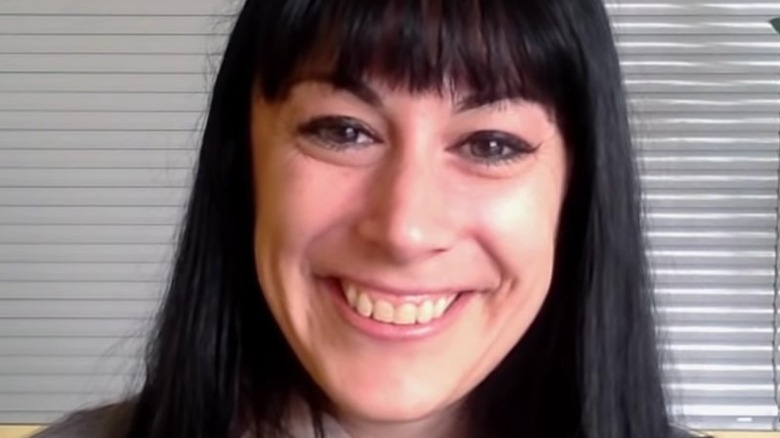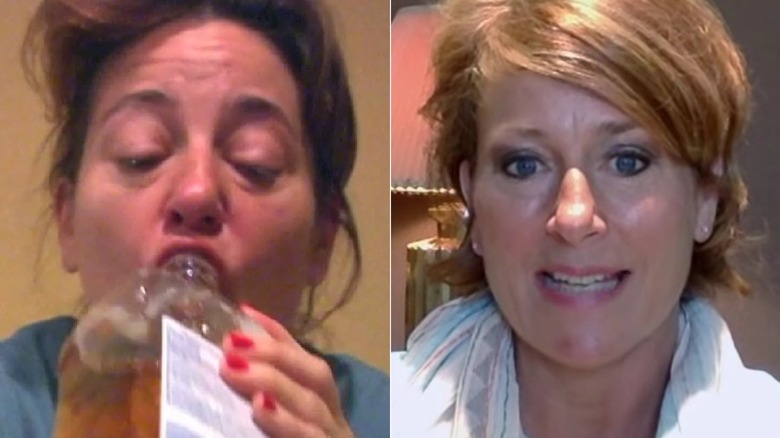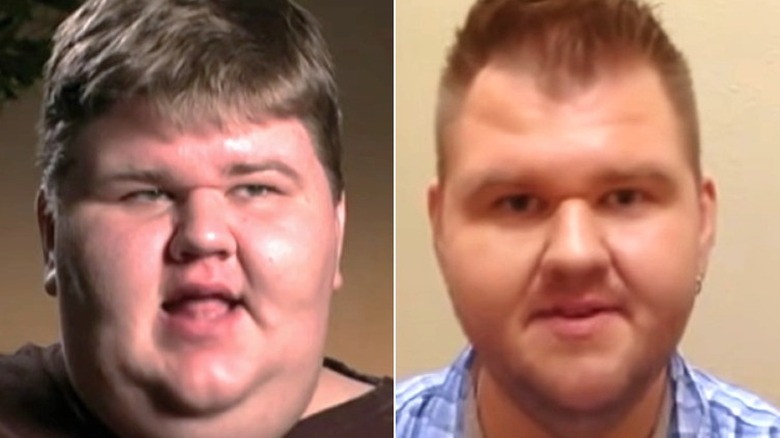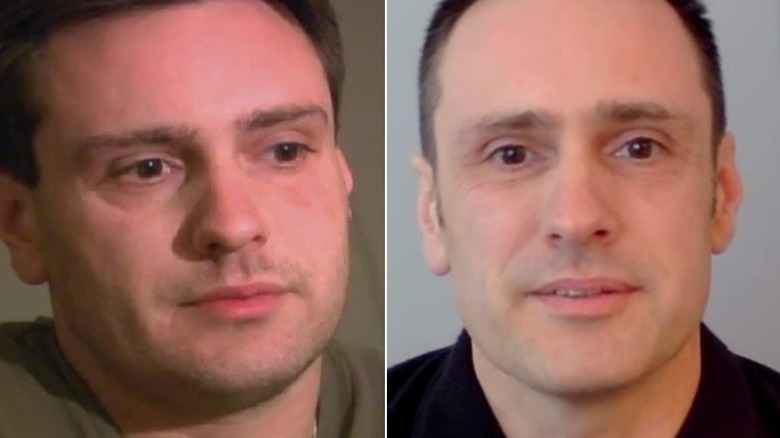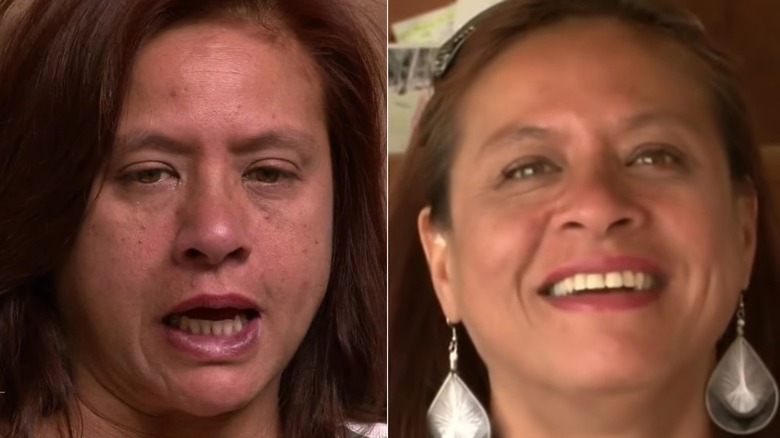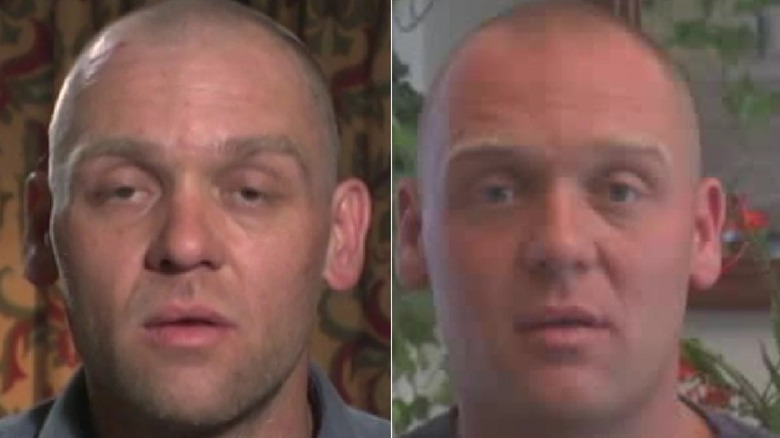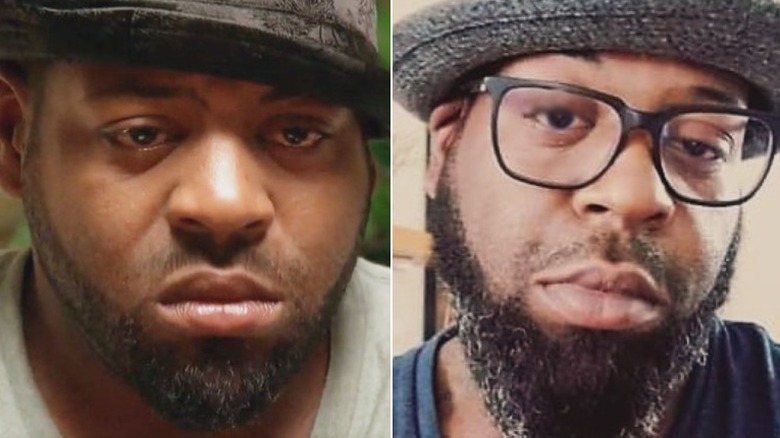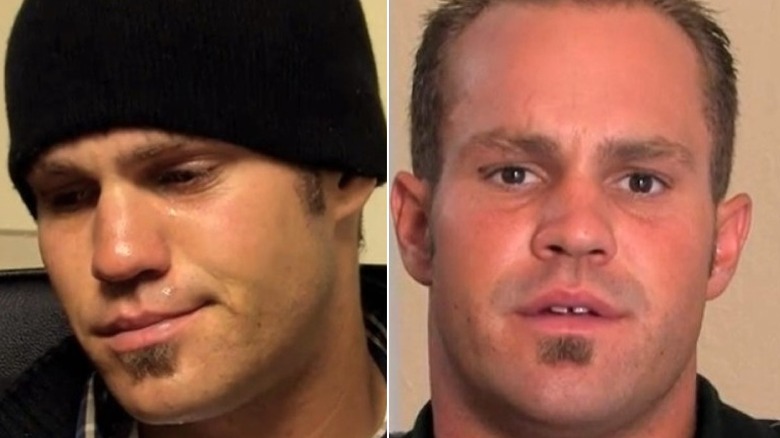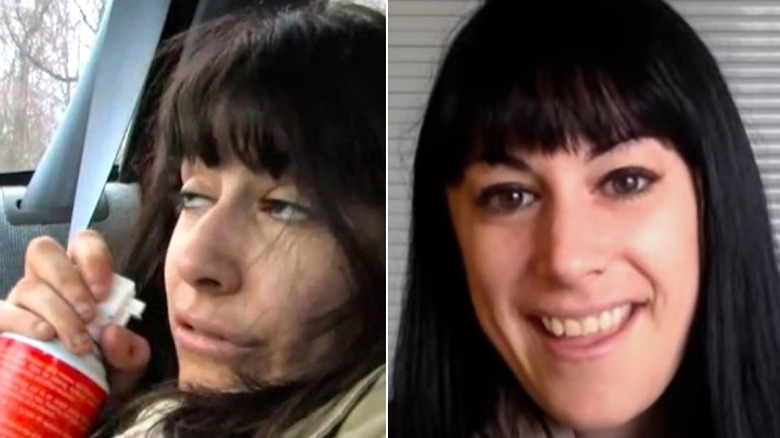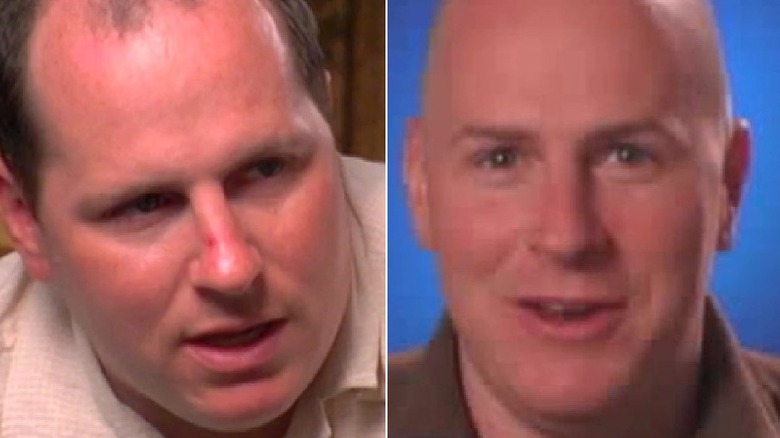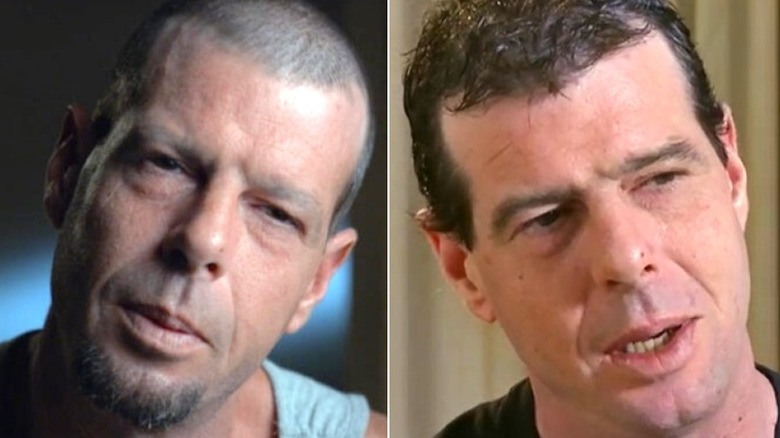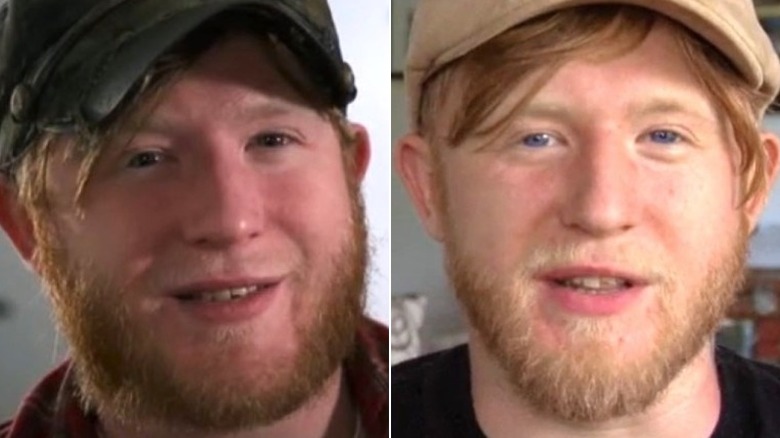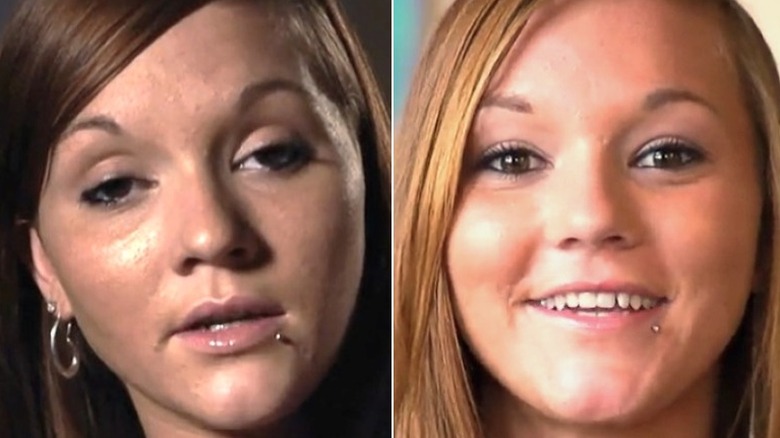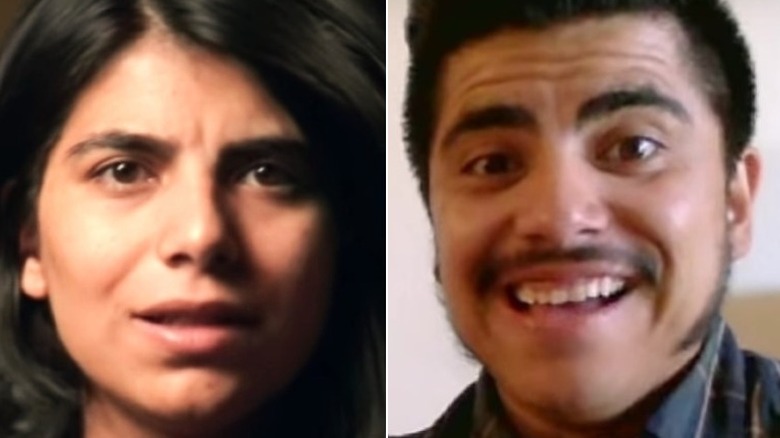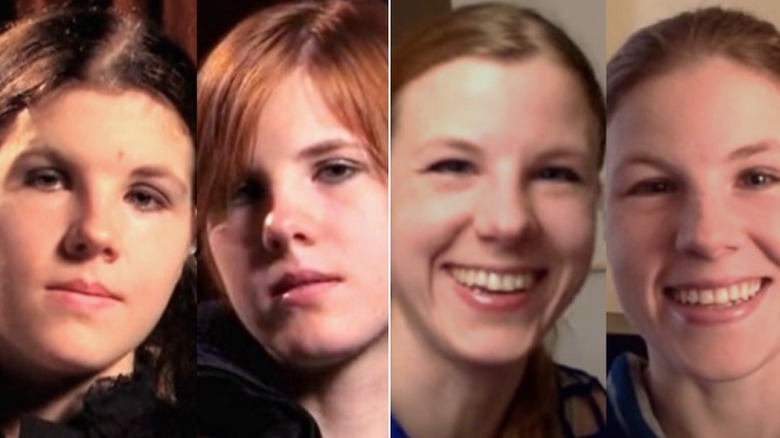The Biggest Success Stories From People Featured On Intervention
"Addiction is just a way of trying to get at something else. Something bigger. Call it transcendence if you want, but it's a rat in a maze. We all want the same thing. We all have this hole. The thing you want offers relief, but it's a trap," Tess Callahan writes in "April & Oliver." It's a quote that'll resonate with anybody in recovery or any fans of "Intervention." No matter how hard addicts try, they'll never fill that gaping hole.
Addiction is one of the few things in today's society that remains equal to all. It doesn't discriminate between race, gender, sexuality, religion, or class. It can envelop anybody –- from struggling single moms to privileged A-grade students to celebrities. And once it takes a grip, chaos and desperation inevitably follow. Family and friends find their lives torn apart, as they struggle to watch their loved ones disappear and even die. It can feel impossible to help. Often, rehab isn't affordable — even if you could persuade the addict to enter treatment — and good luck with that on your own.
"It takes a tremendous amount of courage for a family to put their life's horror on camera," "Intervention" creator Sam Mettler told ABC News. "But they've been living a nightmare for years and don't know what to do." According to The Daily Beast, the show has an astounding 71% success rate for addicts finishing treatment and remaining sober. Here are some of the biggest success stories from people featured on "Intervention."
If you or anyone you know is struggling with addiction issues, help is available. Visit the Substance Abuse and Mental Health Services Administration website or contact SAMHSA's National Helpline at 1-800-662-HELP (4357).
Leslie
Leslie appeared on Season 3 of "Intervention." She was a devoted mom-of-three, PTA member, and Sunday school teacher before becoming an alcoholic. "When she can't get her hands on vodka or wine, Leslie resorts to economy size bottles of mouthwash," her "Intervention" summary reads.
Leslie said she was only a "social drinker" until she turned 40. Then her drinking started becoming heavier and heavier until she became a hardcore alcoholic. Leslie worked her way up to drinking three bottles of wine a day before eventually progressing to two pints of vodka. "Through my relapses and perpetual relapsing in alcoholism, I lost everything," she told Oprah. "I became homeless. I became indigent. I lost my profession. I lost my family. I lost my marriage. I lost all my finances. I lost my home. I lost my dignity. I lost my self-worth."
Thankfully, Leslie finally managed to get sober and has remained so since appearing on "Intervention." She's still attempting to rebuild her life and regain the trust of her family and children –- who her now-ex-husband has full custody of. Leslie hopes her story encourages other women to seek help. "I feel that alcohol among women, stay at homes, women especially, is a hidden disease," she explains in her follow-up clip. "I just wanted to reach out and help one other alcoholic woman, and if my hurt and my pain and my devastation could help just one other woman, that was my goal."
Josh
Josh appeared in Season 4 of "Intervention." The 22-year-old had a food addiction resulting in him becoming morbidly obese. Josh was literally eating himself to death, tipping the scales at 546 lbs -– 360 lbs heavier than his "ideal weight." Josh's dad Rex also had a food addiction. His obesity had led to multiple health issues, including diabetes and numerous strokes (per Intervention Directory). Josh agreed to get treatment. "I have hope, and I think here I will succeed. There's no question," he vowed. And he did. In a follow-up interview, Josh announced he'd lost 239 lbs. "I go to the gym now, five days a week," he shared. "I can run now, and I don't feel like I'm on the precipice of death anymore."
Josh opened up about his weight battle to Oprah. "I don't know if I'd be alive today if it weren't for [Intervention]," he admitted. "They gave me a way to work through the emotional side of it. I dealt with my pain and my emotional hurt by stuffing it down with food –- the same way that an alcoholic drinks, the same way that a drug addict uses."
Josh explained he'd turned to food in an attempt to mask the shame he felt over his sexuality. He'd been raised in "a very conservative Christian family." So, despite being aware that he was gay from the age of 7, it was something he'd suppressed. Now, Josh is out and proud and living his best, authentic life.
If you are struggling with an eating disorder, or know someone who is, help is available. Visit the National Eating Disorders Association website or contact NEDA's Live Helpline at 1-800-931-2237. You can also receive 24/7 Crisis Support via text (send NEDA to 741-741).
John
John Golden's story was featured in Season 2 of "Intervention." He was a chronic alcoholic and crack cocaine addict. "All John can see is the loss in his life," the episode summary reads. "His mother died when he was 12. Recently, he lost his sister, cousin, and best friend." In addition, his ex-girlfriend had miscarried their baby when he was in his 20s.
John turned to drugs and alcohol to bury his emotions. The 33-year-old smoked crack every day for a year and nearly died from a coke overdose. He couldn't work, lost his home, and was on a suicide mission. Meanwhile, John's family was forced to deal with the chaos and havoc his addiction wreaked. An emotional intervention resulted in him going to treatment, where he stayed until he was "strong enough" to leave. "It wasn't easy," John told Community Advocate. "The first few years were tough. The hard part is accepting help."
After returning home, John got a job, married, became a dad, and bought a home. He's maintained his sobriety and talks about addiction, substance abuse, and recovery. "I've been able to speak at several schools, share my story of hope, to give back," John said in his follow-up interview. "That's been one of the greatest parts of it." He admitted the most challenging part of recovery was "accepting" he was an addict and having "to give up a lot" to get clean and sober. "I want to be remembered for my recovery, not my addiction," John concluded.
Penny-Lee
Penny-Lee was a mom who lived in a small village in Hawaii — she was also an alcoholic, becoming ever-increasingly reclusive as she drank herself to death. "Penny-Lee has an infectious laugh and loves to have fun," her episode summary reads. "But despite having a good family life and four children to be proud of, she's an out-of-control alcoholic who spends most of her time alone, screaming and crying out to no one as she downs beer after beer."
"If there's beer in the house, she'll drink it," her son Keola explained. "As long as there's beer in the house, she'll keep going." Penny-Lee's alcoholism caused intense distress to her family as they watched her self-destruct. "The doctors told her if she keeps drinking, she's going to kill herself," her sister admitted. During an emotionally charged intervention, Keola laid it on the line. "Today's the day," he told his mom. "It's alcohol or your family."
Thankfully, she chose the latter, heading to treatment in San Diego. "Once upon a time, I was happy that I had a calm and peaceful life," Penny-Lee announced in her follow-up video. "Now I feel like that person again." She said how much "clearer" and "sharper" her mind was and shared her plans for her future. "My responsibility now is refixing and rebuilding my past," Penny-Lee admitted. She said once she returned home, she would get a degree and start her own business. She followed through and has maintained her sobriety since March 2011.
Coley
Coley was a married dad-of-three working as a timber cutter — the "deadliest profession" in the USA (per Price Economics). When you added his meth addiction to falling trees and screaming chainsaws, you could sense it wouldn't end well. When Coley was 8, his mom began using speed, and his parents divorced. He became an alcoholic at 9. At 13, Coley started "using speed and helping [his mom] sell meth." By 19, he was in prison. But, it was when Coley's mom OD'd and died that his life really spiraled.
"Coley's business is falling apart. His wife can barely stand to talk to him anymore, and his relationship with his three young children is deteriorating," the episode summary reads. "He locks himself away [in] the addict's refuge," The New York Times writes. Unfortunately, Coley's refuge was full of dangerous items, including "flammables" and drug paraphernalia.
In his follow-up interview, Coley admitted getting sober was a "wild ride," but he's happy "inside and out today." He revealed his wife had an "addiction," too. "It's called love," Coley said. "You can boil it down to co-dependency." Francine vowed they were "stopping the cycle" to ensure their children didn't follow in their footsteps. "I needed to do what was right to get home," Coley admitted. "To actually be the father I needed to be." He's been sober since April 2007.
If you or anyone you know is struggling with addiction issues, help is available. Visit the Substance Abuse and Mental Health Services Administration website or contact SAMHSA's National Helpline at 1-800-662-HELP (4357).
Robby
Robby Pardlo was in the group City High with his girlfriend Claudette Ortiz and Ryan Toby. Per Billboard, the group was blowing up after being nominated for a Grammy. Pardlo reflected on how life was in 2003, before things changed. "I was just on the red carpet with Will Smith and Jada, performing with Eve, and I was like, 'Hahaaa!'" he said. Ortiz began seeing Toby, the band split, and Pardlo tried to drink himself to death.
He'd begun drinking as a teen to deal with pressure from his fame-hungry mom. "When Robby's mother discovered his talent for music, she became a classic stage mother and relentlessly pushed him," the episode summary reads. "I just drink to take the edge off; I drink to get drunk," he admitted. Pardlo's alcoholism was wreaking havoc on his family and girlfriend, Anika. She was exhausted from dealing with Pardlo's volatile behavior. He'd been arrested six times for DUI and driven drunk with their daughter Lyric in the car.
He agreed to treatment after an emotional intervention. "I feel a bit fish out of water syndrome, you know?" Pardlo admitted as he entered rehab. "But I'm ready to get my life together." Following treatment, Pardlo moved in with Anika and Lyric — after suffering a brief relapse, he's been sober since July 2010.
Jason
Jason was desperate to gain his father's approval, but it seemed whatever he did was never enough. He started taking drugs and had become an addict by senior year of high school. "A year later, the Columbine High School shooters named Jason one of the bullies they retaliated against," the episode summary reads. "Overcome with guilt and grief for his dead classmates, Jason's addiction escalated."
Jason ended up homeless and injected speedballs into his arm in seedy flophouses. He spent his days panhandling to buy dope. "I wake up, get ready for the day and go out and make money," Jason shared. He no longer cared if he lived or died. "I've overdosed," Jason admitted. "I turned blue, and my eyes rolled in the back of my head, and they threw me in a bathtub with cold water. I probably went out and did another shot right after that."
Following his intervention, Jason entered treatment. He got clean and learned how to accept and process his feelings. "Right now is actually the first time that I've actually really broken down and started really feeling my emotions," he told Oprah Winfrey. Jason vowed to never use again. "I don't want to bring myself to that low again or hurt myself or hurt my family or anybody around me again," he said. In a Facebook Q & A, Jason said he was still sober and "very happy with myself" despite struggling to find work because of people judging his past actions.
Allison
Allison was bright and smart, a pre-med student planning to become a surgeon. Then Allison became addicted to huffing, and everything rapidly went downhill. "She started to inhale computer dust remover, which is potentially fatal with each breath," the episode summary reads. Her pre-med dreams were dashed as a result.
Per American Addiction Centers, "Huffing Dust-Off can be deadly in as little as one use." Allison was inhaling "up to 10 cans" a day. "I feel like I could conquer the world," she announced after a deep huff. Allison also suffered from anorexia and bouts of self-harming. At age 5, she and her sister Erica were allegedly sexually abused. "I saw my baby sister get molested. [It] wasn't right," Allison shared, taking another long huff. The girls were forced to face their alleged molester in court, but he was acquitted due to "lack of evidence." Just months later, their parents went through a brutal divorce.
Treatment forced Allison to address her demons. She shared that she'd been "very dedicated" to her recovery. "I've been working with other addicts, alcoholics, concurring disorders, things like that," Allison announced during her update interview seven years later. "I thought I had died already," she said about her time using. "I'd accepted my life as being over. [And now] things revolve around the positive rather than the negative which never happened in my whole life." According to Allison's Twitter bio, she now has a Ph.D. and works as a therapist.
If you or anyone you know has been a victim of sexual assault, help is available. Visit the Rape, Abuse & Incest National Network website or contact RAINN's National Helpline at 1-800-656-HOPE (4673).
Adam
Adam's heroin addiction was destroying his family, as well as him. "I've cried myself to sleep so many nights. Just praying to God I'd have my brother back," his sister admitted, while his father added, "My family is sick because of this." It wasn't always that way, though. Adam used to have a hot Hollywood career. "I've had a lot of success as an actor. A lot," he shared. "I was on 'The Fresh Prince of Bel-Air,' 'Home Improvement.' I've made a lot of money."
However, per the episode summary, Adam's life began to spiral after turning to heroin to numb the pain of a break-up. Before long, he was down and out, panhandling on the streets to get his next fix. Not surprisingly, Adam's family was at their wit's end as addiction tightened its grip, and he became more detached. They were terrified he was going to die.
"A lot of damage has been done," his dad explained. "And it's not just damage to the addict, but it's damage to every relationship within the family." Adam's intervention forced him to wake up to the suffering his addiction was causing. "I started to realize how much pain I had been causing people who loved me," Adam shared during his follow-up video. "I need to grow up, and I need to [do things] for myself," he admitted. Adam returned to L.A. following treatment and relapsed "several times." In 2008. however, he moved to Florida and has stayed sober ever since.
Dan
Despite Dan being a talented hockey player, his alcoholic father never believed he was good enough. Dan was often victim to his dad's violent outbursts, per the episode summary. He was desperate to mend their relationship. However, when Dan was 28, his father died in an accident. The heartbroken son followed in his dad's footsteps and started drinking.
As alcoholism took over, Dan lost his job, and his wife divorced him, taking their three kids with her. Dan was filled with self-loathing and shame, so he drank more to bury the feelings -– he was in a vicious cycle. "I've seen my dad slowly die over the past couple of years; you just kind of deal with it," his son admitted. "I love beer; it doesn't matter what kind it is," Dan said. "My favorite beer is an open one."
After a successful intervention, Dan headed to rehab. "When you see your loved ones are there with letters and obviously you've hurt them," he said as he entered the treatment facility. "[It just] kind of puts it right into perspective, I suppose," Dan was almost unrecognizable post-rehab. "It is a really good feeling to actually be sober," he announced, confessing it felt great to wake up without a hangover. "I'm a happy person now," Dan admitted. His kids were ecstatic to have their dad back again. "We've been waiting for this moment, and none of us could be happier," his daughter Caitlyn shared. Dan's been sober since August 2018.
If you or anyone you know is struggling with addiction issues, help is available. Visit the Substance Abuse and Mental Health Services Administration website or contact SAMHSA's National Helpline at 1-800-662-HELP (4357).
Ryan
Ryan was a "sweet, sensitive man" who's expecting a baby with his fiancée, Shannon. However, per the episode summary, he's also an alcoholic whose "addiction is spiraling out of control." When Ryan drank, he became belligerent and violent. "It's changing who he is. He's like a completely different person; it's like Jekyll and Hyde," his sister, Francesca, said. "He'll kill himself."
The 25-year-old was super-excited to be a dad and crazy in love with Shannon. "She makes me feel the way I always pictured I'd feel when I met the girl that I was gonna love," he confessed. "I wasn't sure that even existed," he later shared. "If that was real." However, despite seemingly having it all, Ryan still couldn't stop drinking, and his alcoholism was destroying his life. Ryan was drinking "up to 130 beers a week" and had landed in the hospital several times because of booze-fueled incidents. In addition, he frequently vomited blood. His alcoholism was causing severe depression and constant suicidal ideation.
A highly emotional intervention forced Ryan into treatment as he realized what harm his alcoholism was causing his family. "Shannon and the baby coming; they're my future," a tearful Ryan shared. "They're my future, so I'm doing it for them. And for me." After completing four months of rehab, he was at Shannon's side as she gave birth. "The greatest thing I can do is to show up for my daughter completely, every day," Ryan vowed. He has been sober since April 2012.
If you or anyone you know is having suicidal thoughts, please call the National Suicide Prevention Lifeline at 1-800-273-TALK (8255).
Tiffany
Tiffany was a church-going teenager who dreamed of becoming a missionary — then she became a heroin addict. According to the episode summary, the 19-year-old was raised in a strict, religious family. Tiffany wandered around Baltimore, looking for her next fix. At the same time, her family attempted to pray away her addiction, which they viewed as Beezlebub himself. "Satan is coming out of her now," Tiffany's aunt claimed. "She's doing the devil's work," her sobbing grandmother charged.
"[Heroin's] my number one boyfriend. Because it is, it's my number one," Tiffany admitted. "And it comes before anything or anyone." She confessed her addiction ruled her life. "Heroin wears the pants in our relationship," she declared. Tiffany worked as an exotic dancer to help fund her $360 a day habit. She'd also meet up with customers outside of work to earn some extra cash. "Another way I make money is stealing," Tiffany admitted.
After it was revealed that Tiffany had been sexually abused as a child, it was clear that no amount of praying alone would return her to the fold. So, the family turned to "Intervention" for help. "I've been sober for three-and-a-half months," a proud Tiffany announced partway through her rehab. She shared that she felt better "physically" and "mentally" and finally had peace. "In the end [my abuser] didn't win," Tiffany shared. "He may have taken away my childhood, but he didn't take away my life." She's been sober since August 2012.
If you or anyone you know has been a victim of sexual assault, help is available. Visit the Rape, Abuse & Incest National Network website or contact RAINN's National Helpline at 1-800-656-HOPE (4673).
Felix
Felix, who was christened Michelle, had been abandoned by his father when he was 3. When he was 5, a stranger sexually abused him, and he was bullied at school (per IMDb). Felix turned to heroin for comfort, and he was soon hooked. Felix, who went by Michelle and presented as female at the time, fetishized shooting up. "The finding a vein, the putting the needle in my arm, and registering, and feeling the pop of the vein, it's like a romantic dinner," she explained in the episode follow-up.
"When I look in the mirror, I think I should see a boy, a man," Michelle admitted. "My body is like a woman's body, and it makes me feel I'm not right." Michelle's friend said she'd never get "in touch" with her gender identity until she got clean. However, Michelle kept shooting up with increasing frequency.
A tearful intervention ended in Michelle heading to rehab. "Now I'm able to deal with my addiction, with the trans issue," Michelle admitted 90 days into treatment. Five years later, Michelle had transitioned to Felix. "It's so weird how it is now," he admitted. "It's not as hard as it used to be." Felix was also madly in love — with his girlfriend, Margot. "My true self was letting someone love me," he revealed. "Trusting someone." When asked about their future plans, the couple announced they hoped to "have a baby next year." Felix continues to maintain his sobriety.
If you or anyone you know has been a victim of sexual assault, help is available. Visit the Rape, Abuse & Incest National Network website or contact RAINN's National Helpline at 1-800-656-HOPE (4673).
Sonia and Julia
One of the most shocking episodes of "Intervention" involved identical twins, Sonia and Julia. According to the episode summary, the girls "shared everything" as kids and enjoyed a happy childhood. However, everything changed after anorexia got a grip. They focused their competitiveness on obsessive weight loss. Eventually, they were "so stricken with fear that the other will burn more calories that they never let each other out of their sight."
"We're a hot b**ch to each other, basically. I'm killing her," Julia admitted. "I'm killing her," Sonia echoed. After their weight plummeted to a lethally low level, the desperate family turned to "Intervention." The girls were booked into different facilities to break their toxic codependency cycle. "Will Julia be going with me?" Sonia questioned, sobbing. "Will Sonia be there?" a tearful Julia asked. Despite their reticence to be separated, they eventually agreed to treatment.
Seven years later, both twins were looking healthy and happy. Julia admitted her recovery was "a work in progress" but that she'd "maintained for a while." Sonia confessed that she "lost a few pounds" but managed to "gain it back." She shared there was no competition between the two anymore and that now all they want is "the best for each other." The girls revealed they were also "living worlds apart" with Julia in L.A. and Sonia in Germany. "We're living two separate lives," Sonia announced. "A good home, good life, and just love," Julia said her future hopes were. "Just love."
If you are struggling with an eating disorder, or know someone who is, help is available. Visit the National Eating Disorders Association website or contact NEDA's Live Helpline at 1-800-931-2237. You can also receive 24/7 Crisis Support via text (send NEDA to 741-741).

